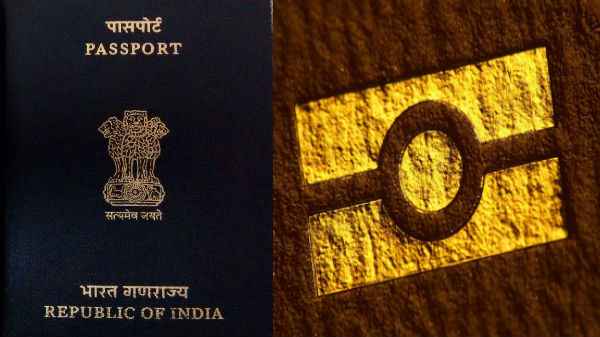When presenting the Union Budget 2022, the Finance Minister Nirmala Sitharaman announced that India will get e-passports with embedded chips in 2022. The e-passport will be valid, similar to the regular passport, but will contain microchips to store important security data in it. The e-passports would be in accordance with the standards of the International Civil Aviation Organization (ICAO). Here is everything you need to know about e-passport India.

What is an e-passport for India?
An e-passport India will have the same features and serve the same purpose as a traditional passport. Since it would have an electronic chip to store user information, it will be more secure than a traditional passport. Passport holder’s name, date of birth, expiry date of passport, etc. would be in the embedded microchip. It will be useful for travelers because there would be no need to stand in long queues at the immigration counter. The e-passport can be scanned in minutes contrary to the physical verification at the immigration counter. It will also be helpful to eliminate fake passport business because the data stored on the microchip won’t be fiddled with.
More than 120 countries, including the US, UK and Germany have already introduced biometric e-passport systems.
Features of an e-passport
- The e-passport for India will have an embedded chip that will include all the personal information of the passport holder.
- The chip will be placed on the back of the passport and will have 64 kilobytes of storage space and an embedded rectangular antenna.
- It would contain information from up to 30 international trips initially.
- The microchip may also contain the picture of the passport holder along with biometric data i.e. fingerprints in the later stage.
- If someone tampers with the chip, the passport authentication will fail.
Benefits of an e-passport
Here are the key benefits of e-passport in India:
- The passport takes a few seconds to be scanned, hence no need to stand in line for a long time.
- The biometric record of the passport holder will prevent fraudsters from conducting data piracy and making duplicate passports.
- If someone tries to tamper it, the passport authentication will fail.
- No one can wipe data from it.
Documents required for e-passport for india
As the e-passport is the same as the traditional passport, the document required for an e-passport will be the same as a regular passport. Here is the list of common documents for a fresh e-passport application:
- Address proof – Any of the following documents:
- Aadhaar card
- Electricity bill
- Telephone bill
- Water bill
- Proof of gas connection
- Rent agreement
- Passport of running bank account
- Passport copy of spouse with first and last pages mentioning the applicant’s name as a spouse. The address mentioned in the passport should match with the address in the application.
- Date of birth proof: Any of the following documents:
- Birth certificate issued by a legal authority
- Matriculation, transfer, or school leaving certificate
- Pan Card
- Life insurance policy in your name
Individuals applying for reissue of passport need to submit the following documents:
- Original passport
- Copy of the first and last pages of the old passport
- Observation page
- ECR or non-ECR page
How an e-passport for India works
An e-Passport features an embedded rectangular antenna type electronic chip of 64-kilobyte to store information of a passport holder. The passport will comply with the standards of the International Civil Aviation Organization (ICAO) to work seamlessly across the world. The passport is designed to prevent data access from any remote source.
Difference between e-passport and regular passport
An e-passport comes with an electronic data chip to provide an added layer of security compared to a traditional passport. An electronic chip embedded passport links a passport to its original owner and prevents counterfeiting.
Generally, a machine-readable (MR) regular passport has data pages with printed information about the owner that an optical reader can scan.
Indian passport holders, ordinary or diplomatic, living abroad, officially known as NRIs, as well as OCI and PIO cardholders can approach SBNRI.com for any sort of online banking, investment, legal and a host of other financial services. For NRI services, including NRI investment in India, NRI account, NRI taxation, etc., you can download SBNRI App from the Google Play Store or App Store. To ask any questions, click on the button below. Also visit our blog and YouTube channel for more details.
FAQs
Till now, the government has issued e-passports to government officials and diplomats, but not to ordinary citizens. The application procedure for e-passport is similar to that for printed booklets. Once the passport application has been processed, the applicant will receive his/ her e-passport.
An electronic passport is the same as the regular passport, but it has an embedded electronic microprocessor chip in the cover to store biometric information that is used to authenticate the identity of the passport holder.
So far India has designed a biometric e-passport for diplomatic passport holders in India and abroad. However, the finance minister announced that India will roll out e-passport with embedded chips for ordinary citizens in 2022-23.



